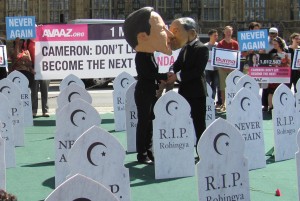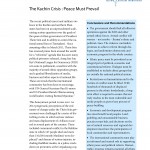Posts Tagged ‘Peace’ (48 found)
Myanmar: UN Special Rapporteur in Official Visit to Assess Human Rights Situation Countrywide
The United Nations Special Rapporteur on the human rights situation in Myanmar, Tomás Ojea Quintana, will undertake an official visit to the country from 11 to 21 August 2013. It will include visits to Rakhine State, Kachin State, Shan State, Chin State and Meikhtila in Mandalay Region […]
• • •Council Conclusions on the Comprehensive Framework for the European Union’s Policy and Support to Myanmar/Burma
The Council adopted the following conclusions:
“The Council welcomes and endorses the attached Comprehensive Framework consisting of priorities for the European Union’s policy and support in the next three years to the on-going reforms in Myanmar/Burma. This Framework sets forth EU’s goals and priorities geared towards building a lasting partnership and promoting closer engagement with the country as a whole […]
• • •Thein Sein’s Words Must be Followed by Action
 President Thein Sein completed his first visit to the UK and France on 18 July with more promises of reform and was prematurely rewarded with trade and investment discussions, military cooperation and a gloss of legitimacy. Although Prime Minister David Cameron, President François Hollande, as well President Thein Sein, paid lip-service to reform and human rights, this does not disguise the reality of a dire human rights situation, the stalled peace process, and the empty promises of reform that characterize Burma today.
President Thein Sein completed his first visit to the UK and France on 18 July with more promises of reform and was prematurely rewarded with trade and investment discussions, military cooperation and a gloss of legitimacy. Although Prime Minister David Cameron, President François Hollande, as well President Thein Sein, paid lip-service to reform and human rights, this does not disguise the reality of a dire human rights situation, the stalled peace process, and the empty promises of reform that characterize Burma today.
One of the promises that Thein Sein made was that all political prisoners would be released by the end of the year. It has been over two years since Thein Sein assumed the office of President, and the amount of times that world leaders have pushed him on this issue has been countless. Yet there remain hundreds of people languishing in jail for their political activism, while the number of new political prisoners is increasing. On the very day that Thein Sein made this statement, a 74 year-old Rohingya human rights activist in Arakan State was arbitrarily arrested and detained. Just a few days later on 18 July, Daw Bawk Ja, a Kachin human rights activist and member of the National Democratic Force, was unlawfully detained on politically motivated charges […]
• • •Appeal by Religious Leaders for Religious Harmony, Greater Attention to Peace, and Human Development
We, religious leaders representing all major religions in Myanmar, warmly wish our country men and women blessings on all of us. As a nation, we are on a journey: a journey that has started after a new dawn of hope in our nation. This country of multiple blessings awaits its destiny […]
• • •Karenni Women at the Border Holds First Convention Back Home
Karenni National Women’s Organization KNWO, the lead women’s organization along the border in Maehongson, Thailand announces the launch of its first Karenni All Women Convention- “Together as One” in Karenni State, Myanmar on June 19 – 21, 2013. ThoeMyar MiNyo, KNWO chairperson says that this first gathering would be a good sign that Karenni women along the border of Thailand and Burma see Burma government to seemingly open its door for the eventual return of Karenni people […]
• • •The Kachin Crisis: Peace Must Prevail
 The recent political unrest and military violence in the Kachin and northern Shan states has been on an unprecedented scale, raising serious questions over the goals of the quasi-civilian government of President Thein Sein and its ability to control the national armed forces (Tatmadaw). Since assuming office in March 2011, Thein Sein has received praise from around the world for a “reformist” agenda that has seen many political prisoners released, Aung San Suu Kyi’s National League for Democracy (NLD) win seats to parliament, ceasefires with the majority of armed ethnic opposition groups, and a gradual liberalisation of media, business and other aspects of national life. These are trends that the international community has been keen to encourage, with UN General-Secretary Ban Ki-moon and US President Barack Obama among world leaders visiting Burma/Myanmar […]
The recent political unrest and military violence in the Kachin and northern Shan states has been on an unprecedented scale, raising serious questions over the goals of the quasi-civilian government of President Thein Sein and its ability to control the national armed forces (Tatmadaw). Since assuming office in March 2011, Thein Sein has received praise from around the world for a “reformist” agenda that has seen many political prisoners released, Aung San Suu Kyi’s National League for Democracy (NLD) win seats to parliament, ceasefires with the majority of armed ethnic opposition groups, and a gradual liberalisation of media, business and other aspects of national life. These are trends that the international community has been keen to encourage, with UN General-Secretary Ban Ki-moon and US President Barack Obama among world leaders visiting Burma/Myanmar […]
Statement to the Chinese Consulate, Chiang Mai
Since the resumption of conflict between the Kachin Independence Army (KIA) and the Burmese government army in June 2011, it has been the government which has been one-sidedly launching offensives for the past 19 months. This has caused over 100,000 Kachin people, including women and children, to flee their homes and seek safe shelter elsewhere […]
• • •Statement to the US Consulate, Chiang Mai
Since the resumption of conflict between the Kachin Independence Army (KIA) and the Burmese government army in June 2011, it has been the government which has been one-sidedly launching offensives for the past 19 months. This has caused over 100,000 Kachin people, including women and children, to flee their homes and seek safe shelter elsewhere […]
• • •Hastily Introduced World Bank Projects Threaten to Undermine Peace Process in Burma
By Khin Ohmar
In late 2012 the World Bank announced its first lending to Burma (also known as Myanmar) in over 20 years. The $80 million grant, to be implemented by the Ministry of Border Affairs, is for community driven development (CDD) projects that are aiming to provide tangible benefits to communities, including those affected by decades of conflict in Burma. The concern among many grassroots activists, however, is that the areas to which this money will be funnelled are still in the earliest stages of the peace process, and that huge influxes of money will undermine efforts for sustainable peace.
On 22 January the Bank’s board will consider its second round of loans to Burma, through a $440 million development policy loan called the ‘Reengagement and reform support programme’. Its objectives are: “to support Myanmar’s critical reforms for strengthening macroeconomic stability, improving public financial management, and improving the investment climate” and to “facilitate the clearance of Myanmar’s arrears to IDA”. This money will flow through the ministry of finance […]
• •Burma: Drop Charges Against Peaceful Protesters
End Protest Denials; Amend Law on Assembly for International Standards
Authorities in Burma should drop charges against activists who participated in peaceful protests against government policies, Human Rights Watch said today. Nine peace activists now face criminal charges for demonstrating in Rangoon without a permit on September 21, 2012, International Peace Day. Anti-mining protesters and land rights activists elsewhere in Burma have also been subject to intimidation and prosecution […]
• • •








 All posts
All posts